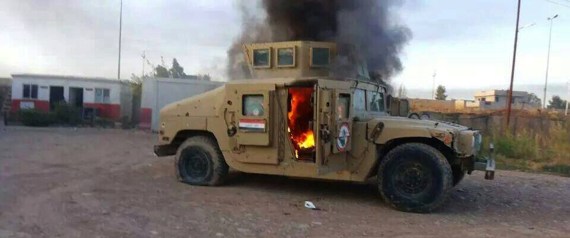Mosul, Iraq's second largest city with a population of 1.6 million has fallen to the ISIS marauders. Tikrit, Hussein's hometown is under fierce attack while alarm bells are ominously sounding in Kirkuk, Dohuk Ibril and even Baghdad. Clearly the oil fields of Iraq and its 3 million bbls daily production capability (of which 2.25 million bbls/day are regularly exported as OPEC oil) risks coming into play.
To quote President Obama, "What we've seen over the last couple of days is the degree to which Iraq is going to need more help. Its going to need more help from us and from the International community." Apparently the Iraqi government has been asking for help for more than a year for surveillance and armed drones to combat the Sunni insurgency (please see AP's Julie Pace "Obama: Iraq Will Need Additional US Assistance" June 12, 2014).
With what we've seen over the last couple of days the question needs be asked why now and not before. Could it be the growing threat to Iraq's oil fields? (Please remember Iraq has been a willing and adamant member of the OPEC cartel whose raison d'etre is to supply oil consumers around the world with cartel manipulated and at extortionary oil prices.)
Certainly the oil markets are reacting as programmed. The price of oil jumped yesterday by $2.13bbl to the highest level since September 2013. And that is only the beginning.
Unquestionably the movements in oil prices will play out into what American consumers will pay for gasoline this summer and beyond,
It appears that any significant intercession, either boots on the ground, air support or meaningful equipment supplements would face acute Congressional opposition. To quote the Chairman of the House Armed Services Committee Howard "Buck" McKeon, R-Calif, "Where are they going to get the funds? To just go in and burn more resources on a place that just seems bent on destruction. We had an opportunity there. They had an opportunity there. We blew it. I don't think we're ready for another one."
Perhaps there is another way to reduce the pressure of ever higher oil prices on the American economy and on the American consumer. That is to enlist our newly found wealth in becoming a major oil and natural gas producer as our ace card in this geopolitical imbroglio, that would have in years past held us and our economy to ransom.
The most direct way of defusing the political and interventionist pressures of the current mayhem would be to release significant volumes from our Strategic Petroleum Reserve which currently harbors in excess of 700,000,000 bbls of oil, a massive quantity brought together when our economy was sorely vulnerable to the international vagaries of the oil market and its politics.
Given the new realities of American fossil fuel production, but a fraction of this staggering stockpile can be considered rational or necessary. A release would vastly diminish the enormous pressure on exchange traded oil prices and safeguard our economy as well.
But wait, oil interests and their Wall Street allies will fight tooth and nail to keep the SPR as is. After all while virtually all Americans will have to pay ever-burgeoning prices for their gasoline or heating oil needs the oilogoply will bathe in ever-greater riches. Isn't that the way things work now? Our government paid for the SPR with resources from the public treasury, taking oil off the market and thereby supporting its price to the cheers if the oil mavens.
But now the SPR, bought and paid for by all Americans, is needed to keep things in balance. The hurdles to overcome to access it by vested oil interests and their legion of lobbyists and political financing capabilities will be huge, and thereby become a true test of our government's leadership in the face of the nations needs. The Administration and Washington must act.

No comments:
Post a Comment